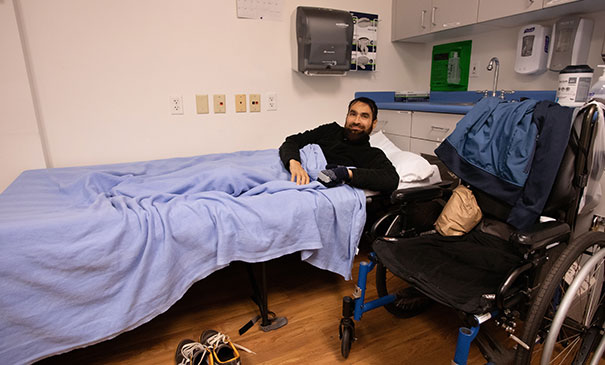
Jim Adkins knows how difficult it can be to operate a homeless shelter.
He spent five years involved with Georgia’s House, a shelter in Kitsap County for women and children. Alongside tangible needs like a bed and a clean bathroom, Jim knows people experiencing homelessness deserve dignity and grace.
“When I learned about Bailey-Boushay House I was very impressed at how they were able to support people in so many angles of life,” Jim says. “Somehow Bailey-Boushay has figured out how to incorporate empathy into everything they do.”
That thread of empathy is what inspired Jim to give to Bailey-Boushay House, supporting the shelter and homeless program. He was most impressed by how BBH is able to serve each client’s individual needs, rather than having everyone follow the same path to getting out of homelessness.
“I think Bailey-Boushay is successful because they make time to support the whole person. When you help a person set goals that they feel are doable — instead of telling them what they have to do — you’re acknowledging the originality of the individual and their needs,” Jim says.
Before becoming part of Georgia’s House, Jim admits he didn’t know much about how or why people become homeless.
“I spent my career in the Navy, on ships and submarines. I was really far away from many of the social and economic issues that lead to homelessness,” he says.
In the Navy, Jim commanded crews of more than 100 sailors who would descend under the ocean in 400-foot submarines for months at a time. As a captain he was charged with creating an environment that encouraged the crew to work together to solve problems – especially in highly stressful situations. That’s where he found similarities between his work in the Navy and making best use of shelter and community resources to support people experiencing homelessness and trauma.
“Being homeless is more than finding consistent work and housing. Many have complicated internal struggles that never go away, which can make it hard to connect with others,” Jim says. “My job in overseeing shelter operations was to make sure our shelter staff were empathetic to our residents, appropriately using community resources, helping each person set achievable goals, and finding ways to be successful when the resident is stressed and full of emotions.”
Initially, Jim only intended to serve on the board for a year or two.
“A friend from the Navy asked me to join and I did because l knew the shelter was going to help women and children during their time of greatest need,” Jim says. “I also knew I had a lot to learn. But my friend said that just like the Navy, the shelter was about bringing people together and finding common ground.”
But after a few months, the shelter was searching for a new President of the Board. Jim’s fellow board members suggested that he take the role, while they searched for a permanent person. Jim ended up leading the shelter for the next several years until he resigned to care for his wife, Rosemary, who was suffering from dementia.
Looking back on his second career of service, Jim remembers one of the greatest challenges was securing consistent funding. He also struggled to retain a compassionate team knowledgeable in social services and skilled in working directly with people experiencing various personal trauma.
“I give to Bailey-Boushay because I know the work, expertise, and financial resources needed to provide people safe, clean housing. Bailey-Boushay does so much more than provide for basic needs. Bailey-Boushay House gives people the emotional foundation and community they need to move their lives in a positive direction,” Jim says.
To make a gift in support of Bailey-Boushay House’s Shelter and Homeless program visit our Support Bailey-Boushay House webpage.
 |
| Terms of Use |  |
Privacy Policy |  |
Notice of Privacy Practices |  |
Site Map |  |
Home |